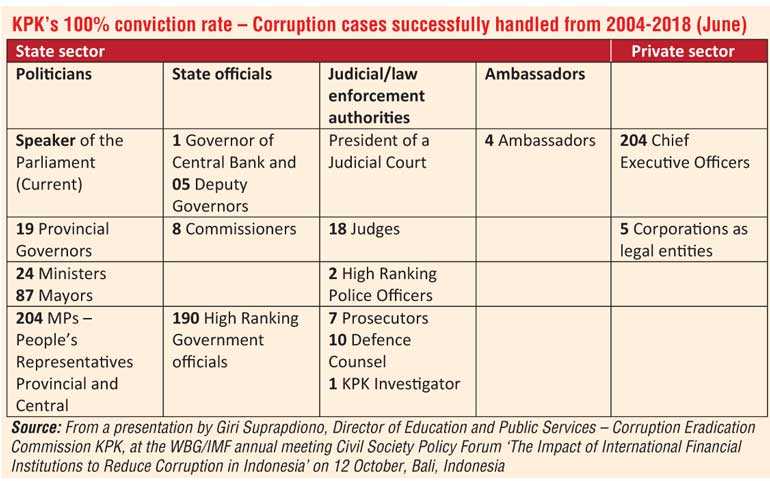Saturday Feb 21, 2026
Saturday Feb 21, 2026
Tuesday, 30 October 2018 00:00 - - {{hitsCtrl.values.hits}}

By Jayasri Priyalal
Institutionalisation of independent commissions and councils through an Act of Parliament was perceived by the public as a step in the right direction to eradicate corruption, the number one enemy that hinders social progress in Sri Lanka.
The average citizen may understand that the true meaning of “suwadeena,” the Sinhala meaning for independence, is the operational element for justice and good governance in the constituted agencies. Public perception is that the officials appointed to the respective institutions to discharge their duties independently for the national interest. However, the degree of their neutrality remains subjective; as they are often compelled to make decisions along with politicians.
Stripping the absolute power vested with the Executive President through the 19th Amendment to the Constitution in appointing independent officials to various public institutions has eliminated space for specific politically-motivated manoeuvring. Yet, the deeply rooted corrupt political loyalties still exist, as the political economy is a vast pool to reap benefits through unethical practices.
On 17 October, President Maithripala Sirisena has directed Bank of Ceylon, Board of Investment and People’s Bank directors to tender their resignations in order to reconstitute the respective boards. As reported in media, the individual ministers, under whose purviews of the institutions are, have made representations to the President in an attempt to persuade him to reverse the decision.
The 19th Amendment to the Constitution sets two terms limit for any individual to hold the position of presidency. This practice is common in mature democracies as a deterrent to executive power being abused by incumbents due to human weaknesses. Although the Executive President has shared some of the absolute authority with other political offices and the parliament, the malpractices inherited throughout the presidential system in Sri Lanka still appears to continue.
Directors in State-owned institutions are collectively responsible and accountable to the public and not to the political masters to whom they pledge loyalties. The only conclusion one can draw from this episode is, the directors appointed to the state institutions are not interested in for setting policies to run the institutions efficiently and effectively, in the interest of all stakeholders in line with Government policies, instead, facilitating the politicians to abuse the system for corrupt practices through political patronage.
The ongoing Presidential Commission of inquiries has revealed extensively how the State-owned banks and other institutions including the Central Bank and EPF funds have been abused for corrupt practices, eroding the public trust in the system purely to meet political ends of those who are in power and amass wealth for politically connected persons.
The systemic erosion of ethics, accountability and integrity of public officials is a matter of great concern for all Sri Lankans. Corruptions in State-owned institutions and greed in the private sector including the sports bodies such as Sri Lanka Cricket are two dangerous viruses that need to be rooted out expeditiously for any Government in power to lure investors to Sri Lanka.
This article is to highlight the salient features of an Anti-Corruption Agency functioning effectively in Indonesia. The achievements of the Indonesian Anti-corruption agency KPK was shared at the recently concluded Civil Society Policy Forum of the World Bank Group annual meeting events held in Bali, Indonesia.
This write up is done with a view to initiating a social dialogue amongst the civil society organisations who are clamouring to institutionalise alternative models with legal teeth to punish those who abuse power, authority to amass wealth through ill-gotten means and recover the assets from the criminals to narrow the widening fiscal deficit in Sri Lanka.
Establishment of a permanent independent Anti-Corruption Agency accountable to the public is a need of the hour, to put an end to the increasing trend of corruptions in state and private sector institutions in Sri Lanka. Kemise Pemerantasan Korupsi [KPK] is the apex Anti-Corruption Agency in Indonesia established following the Asian Financial Crisis in 1997. ADB has initially given technical assistance in setting up of the agency. KPK created in 2003 has a unique structure with the following features:
KPK is transparent in all its activities, and the financial transactions are audited by the Auditor General – Indonesia’s Supreme Audit Board – [BPK]
Since the establishment of KPK in 2004, they have demonstrated remarkable achievement to the delight of the Public and Transparency International (TI) has given a favourable ranking for Indonesia on its anticorruption drives. The Corruption Perception Index [CPI] of Indonesia in 2017 is 37, which has shown a commendable improvement since 2006 with a 13 points gain. Singapore ranks No 6 with a CPI Index of 84, while Indonesia’s world ranking is 96. Although Sri Lanka ranks 91 out of 180 countries with the CPI of 38 in 2017, the following statistics speak for the achievement of KPK Indonesia with a population close to 250 Million.
Indonesia will be a good case study for Sri Lanka to follow as both countries rank the similar CPI ratings. KPK’s structure and the independent functioning features may be used as a role model to develop a permanent Anti-Corruption Agency accountable to the public, thus maintaining its neutrality for political manoeuvring in Sri Lanka as well. Links to KPK websites for further details www.kpk.go.id, www.acch.kpk.go.id, www.aclc.kpk.go.id.